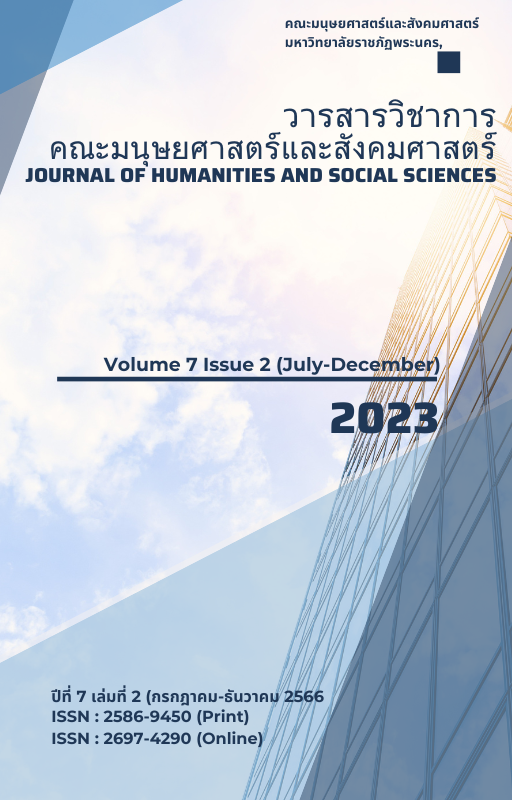THE ROLE OF ANIMACY IN THAI CHILDREN’S RELATIVE CLAUSE ACQUISITION*
Main Article Content
บทคัดย่อ
คุณานุประโยคเป็นโครงสร้างที่มีผู้ศึกษาวิจัยอย่างกว้างขวางเนื่องจากเป็นโครงสร้างที่มีความซับซ้อนโดยเฉพาะอย่างยิ่งคุณานุประโยคแบบประธานและคุณานุประโยคแบบกรรม คุณานุประโยคไม่เพียงแต่มีความซับซ้อนทางโครงสร้างเท่านั้นแต่ยังมีความซับซ้อนทางความหมายอีกด้วยโดยเฉพาะอย่างยิ่งความมีชีวิตของคำนามหลักในคุณานุประโยคซึ่งมีบทบาทสำคัญในการรับคุณานุประโยคในตำแหน่งประธานและกรรม การวิจัยครั้งนี้จึงมุ่งศึกษาบทบาทของความมีชีวิตของคำนามหลักในการสร้างคุณานุประโยคตำแหน่งประธานและกรรมของเด็กไทยก่อนวัยเรียน ผู้วิจัยเก็บข้อมูลการทดลองจากเด็กไทยอายุระหว่าง 2-5 ปีที่อาศัยในกรุงเทพมหานครจำนวน 85 คน โดยใช้ภาพจำนวน 4 ชุดซึ่งประกอบด้วยคำนามที่มีชีวิตและไม่มีชีวิตเป็นเครื่องมือในการวิจัย
ผลการศึกษาพบว่าเด็กทุกช่วงวัยสามารถสร้างคุณานุประโยคในตำแหน่งประธานได้อย่างคล่องแคล่วกว่าคุณานุประโยคในตำแหน่งกรรม โดยเด็กสามารถสร้างคุณานุประโยคในตำแหน่งประธานได้ดีกว่าเมื่อประธานในคุณานุประโยคเป็นสิ่งที่มีชีวิตมากกว่าสิ่งที่ไม่มีชีวิต นอกจากนี้ยังพบว่าเด็กสามารถสร้างคุณานุประโยคในตำแหน่งกรรมได้อย่างคล่องแคล่วกว่าเมื่อกรรมในคุณานุประโยคเป็นสิ่งที่ไม่มีชีวิตมากกว่าสิ่งที่มีชีวิต
Article Details
เอกสารอ้างอิง
De Villiers, J.G., Flusberg, H.B.T., Hakuta, K., & Cohen, M. (1979). Children’s Comprehension of Relative Clauses. Journal of Psycholinguistics Research, 8 (5), 499-518.
Diessel, H. (2000). The Emergency of Relative Clauses in Spontaneous Child Speech. Cognitive Linguistics, 11, 131 – 151.
Diessel, H., & Tomasello, M. (2000). The Development of Relative Clauses in Spontaneous Child Speech. Cognitive Linguistics, 11, 131-151.
Diessel, H., & Tomasello, M. (2005). A New Look at the Acquisition of Relative Clauses. Language, 81, 882-906.
Diessel, H. (2004). The Acquisition of Complex Sentences. New York: Cambridge University Press.
Diessel, H. (2009). On the Role of Frequency and Similarity in the Acquisition of Subject and Non-Subject Relative Clauses. In Talmy Givon and Masayoshi Shibatani (eds.), Syntactic Complexity, 251-276. Amsterdam: John Benjamins.
Goodluck, H. & Tavakolian, S. (1982). Competence and processing in children’s grammar of relative clauses. Cognition 11: 1-17.
Hoque, E. (2021). The Universal Grammar Theory: Noam Chomsky’s Contribution to Second
Language (SL) Education. The Journal of EFL Education and Research, 6 (2), 27-32.
Kidd, E. (2011). The Acquisition of Relative Clauses: Processing Typology and Function. John
Kidd, E., S. Brandt, Lieven, E., & Tomasello, M. (2007). Object relatives made easy: A cross-
linguistic comparison of the constraints influencing young children’s processing of relative
clauses. Language and Cognitive Processes, 22(6), 860––897.
Langacker, R. W. (1991). Foundations of Cognitive Grammar, Vol. 2: Descriptive Application. Stanford: Stanford University Press.
Mak, P., Vonk, W., & Schriefers, H. (2002) The Influence of Animacy on Relative Clause Processing. Journal of Memory and Language, 47 (1), 50-68.
Okigiri, M. (2018). The Animancy Status in the Production of English Relative Constructions by Japanese Learners in Spoken and Written Discourse. The 18th Biennial Conference of the Japanese Studies Association of Australia at the Australian National University, Asutralia.
Pearl, L. (2021). Theory and Predictions for the Development of Morphology and Syntax: A
Universal Grammar+Statistics Approach. Journal of Child Language, 48, 907-936.
Pindabaedya, P. (2018). The Acquisition of Relative Clauses in Thai Preschool Children [Doctoral Dissertation]. Kasetsart University.
Pindabaedya, P., & Indrambarya, K. (2018). Relativization Strategies of 2 to 5-year-old Thai Children. Parichart Journal, 31 (2), 36-58.
Sangkharam, P., & Indrambarya, K., (2018). The Acquisition of Thai Classifiers: Order and Strategies. JSEALS Special Publication No.2: Papers from the Chulalongkorn International Student Symposium on Southeast Asian Linguistics 2017.
Sheldon, A. (1974). The Role Parallel function in the Acquisition of Relative Clauses in English. Journal of Verbal Learning and Verbal Behavior, 13: 272-281.
Tavakolian, S. (1977). Structural Principles in the Acquisition of Complex Sentences. [Doctoral Dissertation]. University of Massachusetts.


